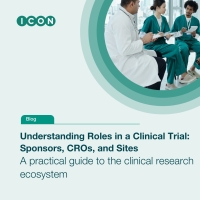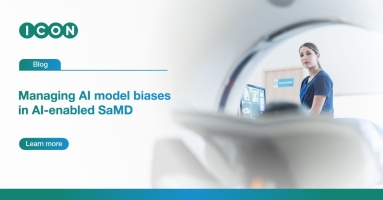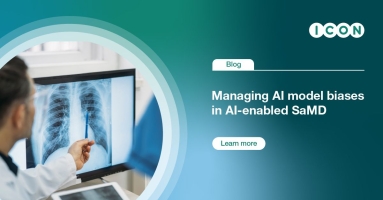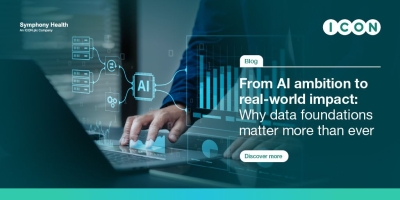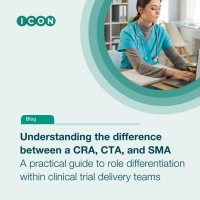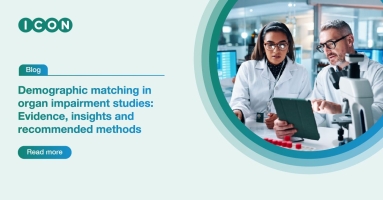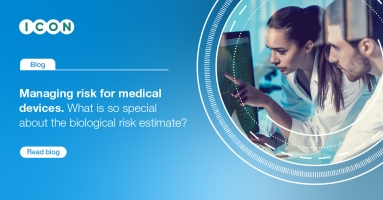Understanding how clinical trials are delivered starts with clarity on the roles that shape them. Our latest blog explains how sponsors set the research agenda and retain oversight, how CROs manage operational delivery...
Filter blogs
Filter blogs by either clicking within the ‘Category’ drop-down list, or begin typing which will automatically match to the nearest available category. Note - not all categories will display results if selecting a particular year.
-

Advancing patient-centred outcomes in sleep medicine
PLATO‑11 is a newly validated, freely accessible patient‑reported outcome instrument developed by ICON in collaboration with the American Academy of Sleep Medicine to address long‑standing gaps in patient‑centred assessment for obstructive sleep apnoea. Built through rigorous qualitative and quantitative research, PLATO‑11 captures the real‑world, day‑to‑day impact of OSA and supports more personalised, evidence‑based care in both clinical practice and research.
-

Managing AI model biases in AI-enabled SaMDs
Medical device developers using AI in software as a medical device must avoid AI biases to optimise their SaMDs and limit health disparity perpetuation.
-

Connecting healthcare data to digital campaigns: Solving the attribution challenge
A clear look at how durable identity, privacy‑safe tokenisation, and high match rates help healthcare marketers connect audiences across fragmented channels and confidently measure real‑world outcomes.
-

From AI ambition to real world impact
AI in pharma is stalling due to poor data foundations. Discover what makes healthcare data AI-ready—and how Symphony Health, an ICON plc company, delivers the solution.
-

The current landscape of oncology R&D
The panelists discussed promising scientific and strategic pathways in oncology, including next-generation therapeutic modalities, precision trial strategies, AI applications with demonstrated and measurable impact, regulatory and market readiness, and collaborative models for accelerating early-phase oncology programs.
-

Mechanism of action in pediatric research
Discover how EMA’s proposed MoA-based PIP requirements mirror the US RACE for Children Act and how sponsors can prepare for pediatric regulatory changes.
-

2025 awards and recognition
ICON received a range of prestigious awards and brand recognition in 2025, reaffirming its leadership across clinical research innovation and excellence, employer excellence, long-term sustainable growth and impactful medical communications deliverables for clients.
-

Bring in the biotechs
When Deepali Suri stepped into her new role as president of ICON’s biotech division in September 2025, she brought with her more than two decades of experience across big pharma, biotech, and CROs. She also brought a clear vision for the industry’s future. Read to learn more.
-

Managing risk for medical devices part 4
This blog looks into the logical basis for the use of comparisons in biological risk estimation. The same basic principle has been used for over 50 years. A comparative approach, presented as guidance in ISO 10993-18:2005, has now been transformed into a key element of ISO 10993-1:2025.
-

Demographic matching in organ impairment studies
Learn why demographic matching matters in organ impairment studies, explore IM vs GM strategies, and get practical tips aligned with FDA and EMA guidance.
-

The changing regulatory requirements for biosimilar drug development: more nuanced than they initially appear
Biosimilars are rising in importance in modern healthcare, offering cost-effective alternatives to biologic medicines and improving patient access to life-saving therapies. However, the regulatory landscape governing their development has been anything but static.
-

Managing risk for medical devices part 3
In this series, we review ISO 14971 (Application of risk management to medical devices)—its history, the principles embedded within it and how it relates to other standards and regulation.
-

Biomarkers and breakthroughs
Biomarkers bring us closer than ever to meaningful neurodegenerative therapies. Learn how a robust approach to biomarkers can reshape trial design, diagnosis and patient outcomes.
-

Managing risk for medical devices part 2
In this series, we review ISO 14971 (Application of risk management to medical devices)—its history, the principles embedded within it and how it relates to other standards and regulation. In this edition we discuss ISO 14971: What it is and is not.
-

More than awareness—taking action to address IPV as an SDOH in clinical trials
Explore the considerations for intimate partner violence as a social determinant of health and key actions to address IPV for clinical trial participants.
-

Understanding FDA regulations for AI in SaMD
Despite an increase in AI-enabled medical devices receiving FDA approval there is no distinct regulatory route. Learn about FDA guidance on AI in SaMD.
-

MASH: Liver health’s silent epidemic
Learn about recent developments in MASH research and treatment and how Symphony Health data addresses the challenges of liver health’s silent epidemic.
-

Strategies for successful Integrated Summary of Efficacy and Safety (ISS/ISE) submissions
Developing an integrated summary of safety and efficacy (ISS/ISE) can be complex. This blog outlines practical strategies to organise data, plan efficiently and ensure compliant, high-quality submissions.
-

Enhancing clinical trials in obesity by integrating COAs and DHTs
As obesity treatments evolve, traditional weight-centric endpoints are no longer enough. This blog examines how Clinical Outcome Assessments (COAs) and Digital Health Technologies (DHTs) are reshaping obesity clinical trials and aligning research with what truly matters to patients.
-

Customer advocacy: A strategic imperative for regulatory consultancy excellence
Customer advocacy is key to regulatory consultancy success. In life sciences, trust, transparency, and client-focused partnerships are essential for navigating complexity and driving performance.
In this section
-
Digital Disruption
-
Clinical strategies to optimise SaMD for treating mental health
-
Digital Disruption: Surveying the industry's evolving landscape
- AI and clinical trials
-
Clinical trial data anonymisation and data sharing
-
Clinical Trial Tokenisation
-
Closing the evidence gap: The value of digital health technologies in supporting drug reimbursement decisions
- mHealth wearables
-
Personalising Digital Health
- Real World Data
-
The triad of trust: Navigating real-world healthcare data integration
-
Decoding AI in software as a medical device (SaMD)
- Software as a medical device (SaMD)
-
Clinical strategies to optimise SaMD for treating mental health
-
Patient Centricity
-
Accelerating clinical development through DHTs
-
Agile Clinical Monitoring
-
Capturing the voice of the patient in clinical trials
-
Charting the Managed Access Program Landscape
- Representation and inclusion in clinical trials
-
Exploring the patient perspective from different angles
-
Patient safety and pharmacovigilance
-
A guide to safety data migrations
-
Taking safety reporting to the next level with automation
-
Outsourced Pharmacovigilance Affiliate Solution
-
The evolution of the Pharmacovigilance System Master File: Benefits, challenges, and opportunities
-
Sponsor and CRO pharmacovigilance and safety alliances
-
Understanding the Periodic Benefit-Risk Evaluation Report
-
A guide to safety data migrations
-
Patient voice survey
-
Patient Voice Survey - Decentralised and Hybrid Trials
-
Reimagining Patient-Centricity with the Internet of Medical Things (IoMT)
-
Using longitudinal qualitative research to capture the patient voice
-
Prioritising patient-centred research for regulatory approval
-
Accelerating clinical development through DHTs
-
Regulatory Intelligence
-
Accelerating access
-
Meeting requirements for Joint Clinical Assessments
-
Navigating the regulatory landscape in the US and Japan:
-
Preparing for ICH GCP E6(R3) implementation
-
An innovative approach to rare disease clinical development
- EU Clinical Trials Regulation
-
Using innovative tools and lean writing processes to accelerate regulatory document writing
-
Current overview of data sharing within clinical trial transparency
-
Global Agency Meetings: A collaborative approach to drug development
-
Keeping the end in mind: key considerations for creating plain language summaries
-
Navigating orphan drug development from early phase to marketing authorisation
-
Procedural and regulatory know-how for China biotechs in the EU
-
RACE for Children Act
-
Early engagement and regulatory considerations for biotech
-
Regulatory Intelligence Newsletter
-
Requirements & strategy considerations within clinical trial transparency
-
Spotlight on regulatory reforms in China
-
Demystifying EU CTR, MDR and IVDR
-
Transfer of marketing authorisation
-
Exploring FDA guidance for modern Data Monitoring Committees
-
Streamlining dossier preparation
-
Accelerating access
-
Therapeutics insights
-
Endocrine and Metabolic Disorders
- Cardiovascular
- Cell and Gene Therapies
-
Central Nervous System
-
A mind for digital therapeutics
-
Challenges and opportunities in traumatic brain injury clinical trials
-
Challenges and opportunities in Parkinson’s Disease clinical trials
-
Early, precise and efficient; the methods and technologies advancing Alzheimer’s and Parkinson’s R&D
-
Key Considerations in Chronic Pain Clinical Trials
-
ICON survey report: CNS therapeutic development
-
A mind for digital therapeutics
-
Glycomics
- Infectious Diseases
- NASH
- Obesity
- Oncology
- Paediatrics
-
Respiratory
-
Rare and orphan diseases
-
Advanced therapies for rare diseases
-
Cross-border enrollment of rare disease patients
-
Crossing the finish line: Why effective participation support strategy is critical to trial efficiency and success in rare diseases
-
Diversity, equity and inclusion in rare disease clinical trials
-
Identify and mitigate risks to rare disease clinical programmes
-
Leveraging historical data for use in rare disease trials
-
Natural history studies to improve drug development in rare diseases
-
Patient Centricity in Orphan Drug Development
-
The key to remarkable rare disease registries
-
Therapeutic spotlight: Precision medicine considerations in rare diseases
-
Advanced therapies for rare diseases
-
Endocrine and Metabolic Disorders
-
Transforming Trials
-
Accelerating biotech innovation from discovery to commercialisation
-
Demystifying the Systematic Literature Reviews
-
Ensuring the validity of clinical outcomes assessment (COA) data: The value of rater training
-
From bottlenecks to breakthroughs
-
Linguistic validation of Clinical Outcomes Assessments
-
More than monitoring
-
Optimising biotech funding
- Adaptive clinical trials
-
Best practices to increase engagement with medical and scientific poster content
-
Decentralised clinical trials
-
Biopharma perspective: the promise of decentralised models and diversity in clinical trials
-
Decentralised and Hybrid clinical trials
-
Practical considerations in transitioning to hybrid or decentralised clinical trials
-
Navigating the regulatory labyrinth of technology in decentralised clinical trials
-
Biopharma perspective: the promise of decentralised models and diversity in clinical trials
-
eCOA implementation
-
Blended solutions insights
-
Clinical trials in Japan: An enterprise growth and management strategy
-
How investments in supply of CRAs is better than competing with the demand for CRAs
-
The evolution of FSP: not just for large pharma
-
Embracing a blended operating model
-
Observations in outsourcing: Survey results show a blended future
-
Clinical trials in Japan: An enterprise growth and management strategy
-
Implications of COVID-19 on statistical design and analyses of clinical studies
-
Improving pharma R&D efficiency
-
Increasing Complexity and Declining ROI in Drug Development
-
Innovation in Clinical Trial Methodologies
- Partnership insights
-
Risk Based Quality Management
-
Transforming the R&D Model to Sustain Growth
-
Accelerating biotech innovation from discovery to commercialisation
-
Value Based Healthcare
-
Strategies for commercialising oncology treatments for young adults
-
US payers and PROs
-
Accelerated early clinical manufacturing
-
Cardiovascular Medical Devices
-
CMS Part D Price Negotiations: Is your drug on the list?
-
COVID-19 navigating global market access
-
Ensuring scientific rigor in external control arms
-
Evidence Synthesis: A solution to sparse evidence, heterogeneous studies, and disconnected networks
-
Health technology assessment
-
Perspectives from US payers
-
ICER’s impact on payer decision making
-
Making Sense of the Biosimilars Market
-
Medical communications in early phase product development
-
Navigating the Challenges and Opportunities of Value Based Healthcare
-
Payer Reliance on ICER and Perceptions on Value Based Pricing
-
Payers Perspectives on Digital Therapeutics
-
Precision Medicine
-
RWE Generation Cross Sectional Studies and Medical Chart Review
-
Survey results: How to engage healthcare decision-makers
-
The affordability hurdle for gene therapies
-
The Role of ICER as an HTA Organisation
-
Integrating openness and precision for competitive advantage
-
Strategies for commercialising oncology treatments for young adults
-
Blog
-
Videos
-
Webinar Channel
